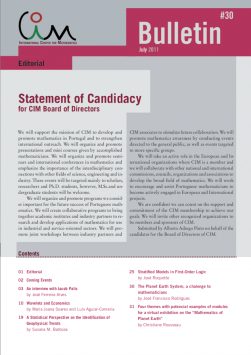Editorial
Alberto Adrego Pinto
1
We will support the mission of CIM to develop and promote mathematics in Portugal and to strengthen international outreach. We will organize and promote presentations and mini courses given by accomplished mathematicians. We will organize and promote seminars and international conferences in mathematics and emphasize the importance of the interdisciplinary connections with other fields of science, engineering and in- dustry. These events will be targeted mainly to scholars, researchers and Ph.D. students, however, M.Sc.and un- dergraduate students will be welcome.
- Elementary Geometry from an Advanced Point of View
- NOMA’11: International Workshop on Nonlinear Maps and their Applications
- Intelligent Data Analysis Analyzing and Understanding Complex Systems
Jacob Palis
José Ferreira Alves
3-9
On the 24th February 2011, after delivering a Pedro Nunes Lecture at the University of Porto.
Wavelets and Economics
Maria Joana Soares
Luís Aguiar-Conraria
10-18
The use of wavelet analysis is very common in a large variety of disciplines, such as signal and image processing, quantum mechanics, geophysics, medicine, biology, etc. In economics, however, wavelets are still a mysterious, but colorful, tool for time-series analysis.
A statistical perspective on the identification of geophysical trends
Susana M. Barbosa
19-20
In the diverse geoscience problems investigated at the Instituto Dom Luiz (IDL), a partner of CIM, the iden- tification and quantification of trends is one of the most ubiquitous activities. From the analysis of the outputs of complex meteorological numerical models in a climate change context to the exploitation of geophysical re- sources and renewal energy sources, accurate knowledge of trends and corresponding uncertainties is fundamen- tal for answering most scientific and societal questions.
Some mathematical aspects of mountain waves: work carried out at Instituto Dom Luiz
Miguel A. C. Teixeira
21-24
Research in many areas of the Geosciences is pursued at Instituto Dom Luiz (IDL), an Associated Laboratory of the University of Lisbon that is a partner of CIM. In the Atmospheric and Climate Modelling group at IDL, research on basic fluid dynamics relevant to meteorology is carried out, using numerical and analytical methods. As a member of this research group with a particular interest in analytical and semi-analytical mathematical techniques, the author will try to describe in this paper some aspects of research on mountain waves, which is perhaps one of the most interesting areas from an applied mathematics point of view.
Stratified Models in First-Order Logic
José Roquette
25-29
The various nature of the mathematical objects in what concerns their complexity, our knowledge of them or the possibility to make them explicit (for example, infinitesimal or ilimited real numbers) is a strong motivation to consider their distribution into levels or strata. The stratification depends on the selected property (or properties) of the mathematical objects that are the subject-matter of our study
The Planet Earth System, a challenge to mathematicians
José Francisco Rodrigues
30-31
In 2000 the World Mathematical Year offered an occasion for a collective reflection on the great challenges of the 21st Century, on the role of Mathematics as a key for the development and on the importance of the image of Mathematics in the public understanding. The countless repeated phrase “the Universe is written in mathematics language”, written by Galileu in 1614, is truer than ever but it raises new challenges in the current age of data-intensive science driven, in particular, by the information and communication technologies. The “rising tide of scientific data” created by the digital revolution provides new possibilities to face some of society’s great challenges of energy and water supply, global warming and healthcare
Four themes with potential examples of modules for a virtual exhibition on the “Mathematics of Planet Earth”
Christiane Rousseau
31-32
A Planet to discover: oceans; meteorology and climate; mantle processes, natural resources; celestial mechanics; cartography.
